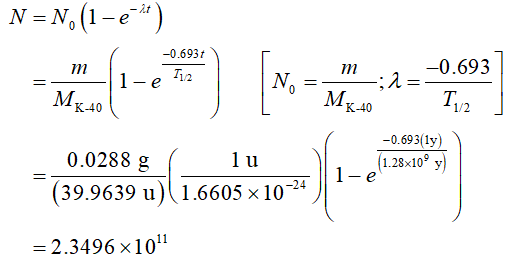Potassium is a crucial element for the healthy operation of the human body. Potassium occurs naturally in our environment (and thus our bodies) as three isotopes: Potassium-39, Potassium-40, and Potassium-41. Their current abundances are 93.26%, 0.012% and 6.728%. A typical human body contains about 3.0 grams of Potassium per kilogram of body mass. How much Potassium-40 is present in a person with a mass of 80 kg? If, on average, the decay of Potassium-40 results in 1.10 MeV of energy absorbed, determine the effective dose (in Sieverts) per year due to Potassium-40 in an 80-kg body. Assume an RBE of 1.2. The half-life of Potassium-40 is 1.28 x 109 years.
Potassium is a crucial element for the healthy operation of the human body. Potassium occurs naturally in our environment (and thus our bodies) as three isotopes: Potassium-39, Potassium-40, and Potassium-41. Their current abundances are 93.26%, 0.012% and 6.728%. A typical human body contains about 3.0 grams of Potassium per kilogram of body mass. How much Potassium-40 is present in a person with a mass of 80 kg? If, on average, the decay of Potassium-40 results in 1.10 MeV of energy absorbed, determine the effective dose (in Sieverts) per year due to Potassium-40 in an 80-kg body. Assume an RBE of 1.2. The half-life of Potassium-40 is 1.28 x 109 years.
Related questions
Question
Potassium is a crucial element for the healthy operation of the human body. Potassium occurs naturally in our environment (and thus our bodies) as three isotopes: Potassium-39, Potassium-40, and Potassium-41. Their current abundances are 93.26%, 0.012% and 6.728%. A typical human body contains about 3.0 grams of Potassium per kilogram of body mass.
- How much Potassium-40 is present in a person with a mass of 80 kg?
- If, on average, the decay of Potassium-40 results in 1.10 MeV of energy absorbed, determine the effective dose (in Sieverts) per year due to Potassium-40 in an 80-kg body. Assume an RBE of 1.2. The half-life of Potassium-40 is 1.28 x 109 years.
Expert Solution
Step 1
1) Amount of Potassium-40

Step 2
Number of particles decayed

Step by step
Solved in 4 steps with 4 images
